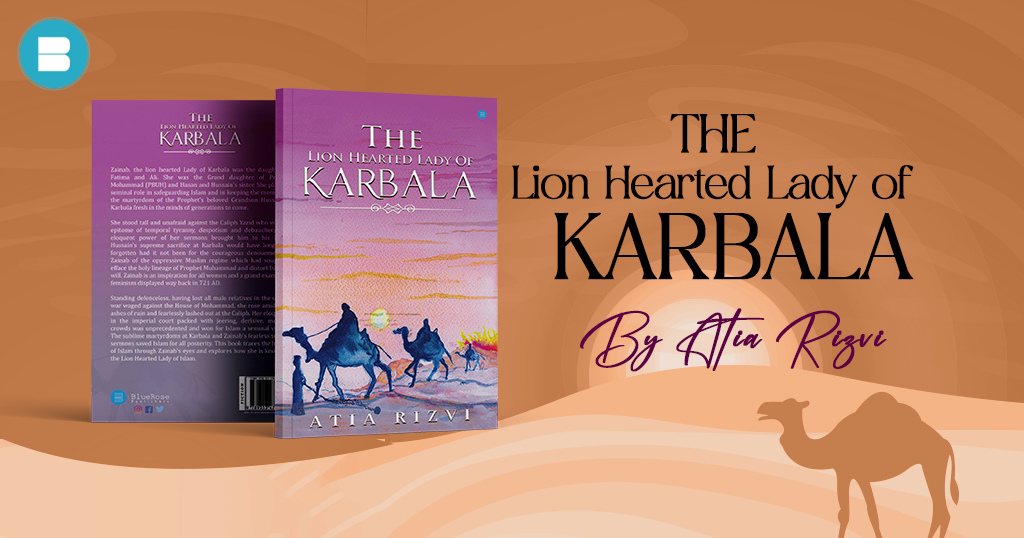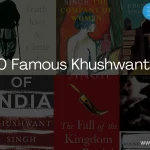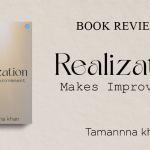Book: The Lion Hearted Lady of Karbala
Author: Atia Rizvi
Blurb: “Zainab, the lion-hearted Lady of Karbala, was the daughter of Fatima and Ali. She was the granddaughter of Prophet Mohammad (PBUH) and Hasan and Hussain’s sister. She played a seminal role in safeguarding Islam and in keeping the memory of the martyrdom of the Prophet’s beloved grandson Hussain at Karbala fresh in the minds of generations to come.
She stood tall and unafraid against the Caliph Yazid, who was the epitome of temporal tyranny, despotism, and debauchery. The eloquent power of her sermons brought him to his knees. Hussain’s supreme sacrifice at Karbala would have long been forgotten had it not been for the courageous denouement by Zainab of the oppressive Muslim regime, which had sought to efface the holy lineage of Prophet Muhammad and distort Islam at will. Zainab is an inspiration for all women and a grand example of feminism, displayed way back in 721 AD.
Standing defenceless, having lost all male relatives in the unholy war waged against the House of Mohammad, she rose amidst the ashes of ruin and fearlessly lashed out at the Caliph. Her eloquence in the imperial court, packed with jeering, derisive, mocking crowds, was unprecedented and won Islam a seminal victory. The sublime martyrdoms at Karbala and Zainab’s fearless searing sermons saved Islam for all posterity. This book traces the history of Islam through Zainab’s eyes and explores how she is known as the Lion Hearted Lady of Islam.”
Review: Few figures in Islamic history stand as resolute and inspiring as Zainab, the Lion-Hearted Lady of Karbala. In her book, titled “The Lion-Hearted Lady of Karbala,” Atia Rizvi takes readers on a poignant journey through the life and legacy of this remarkable woman who played a pivotal role in safeguarding Islam and preserving the memory of the martyrdom of Imam Hussain, the beloved grandson of Prophet Muhammad (PBUH). This book is a testament to courage, faith, and the enduring power of resistance against oppression.
Zainab, the granddaughter of the Prophet and born to Fatima and Ali, emerges as an iconic figure who defied tyranny and injustice during one of the darkest chapters in Islamic history. Rizvi’s book not only sheds light on Zainab’s pivotal role but also delves deep into the historical context of her time, making it a valuable resource for those seeking a comprehensive understanding of this period.
The narrative begins by introducing Zainab as a central figure within the Ahlul Bayt, the family of the Prophet. Rizvi skillfully weaves together the historical backdrop, tracing the lineage and heritage of Zainab and setting the stage for readers to grasp the profound significance of her actions and words.
One of the strengths of this book is its ability to transport readers to the heart of Karbala, where the tragedy of Imam Hussain’s martyrdom unfolded. Rizvi’s vivid descriptions and meticulous research immerse readers in the sights and sounds of the battlefield and the aftermath. The book evokes a deep sense of empathy for Zainab, who witnessed the unimaginable horrors of Karbala and endured the loss of her beloved family members.
The author also highlights Zainab’s courage in the face of adversity, particularly her unwavering stand against the Caliph Yazid. Rizvi’s portrayal of Zainab’s eloquence and fearlessness in the imperial court is nothing short of awe-inspiring. Zainab’s impassioned sermons not only challenged the oppressive regime but also served as a rallying cry for justice and truth.
Rizvi underscores how Zainab’s resilience and resolve became a beacon of hope and an embodiment of feminism in the 7th century. In a society dominated by patriarchal norms, Zainab’s fearless defiance of tyranny and her ability to articulate her convictions in the most challenging circumstances make her an enduring symbol of empowerment for women.
The book explores Zainab’s legacy, emphasising the enduring impact of her actions. It eloquently illustrates how her steadfastness ensured that the sacrifice of Imam Hussain and his companions at Karbala would not be forgotten. Through Zainab’s efforts, the memory of Karbala was kept alive, and the message of justice and righteousness continued to resonate through generations.
One of the book’s notable achievements is its ability to bring the historical and religious context to life. Readers gain insights into the socio-political climate of the time, the power struggles within the Islamic community, and the moral dilemmas faced by those who chose to stand with Imam Hussain. Rizvi skillfully navigates these complexities, providing readers with a comprehensive understanding of the events leading up to Karbala and their repercussions.
While the book primarily focuses on Zainab’s life and contributions, it also offers a broader perspective on the significance of Karbala in Islamic history. It underscores how the martyrdom of Imam Hussain and the resilience of figures like Zainab became defining moments in the struggle for justice within Islam. This contextualization adds depth to the narrative and enhances the reader’s appreciation of the broader historical significance of these events.
“The Lion-Hearted Lady of Karbala” is a well-researched and passionately written tribute to a remarkable historical figure. Atia Rizvi’s narrative style is engaging and accessible, making the book accessible to readers with varying levels of familiarity with Islamic history. The author’s deep reverence for Zainab and her commitment to preserving her legacy shine through on every page.
In addition to its historical and religious significance, this book also serves as a call to action. It reminds readers of the timeless importance of standing up against injustice and tyranny, regardless of the era. Zainab’s example becomes a source of inspiration for those who seek to make a positive impact on their communities and the world at large.
In conclusion, “The Lion-Hearted Lady of Karbala” by Atia Rizvi is a compelling and informative exploration of the life and legacy of Zainab, a towering figure in Islamic history. Through meticulous research and eloquent storytelling, Rizvi brings Zainab’s story to life, shedding light on her pivotal role in preserving the memory of Karbala and her enduring impact as an icon of courage and faith.
This book is not only a valuable historical resource but also a source of inspiration for anyone who values justice, resilience, and the unwavering pursuit of truth.
















